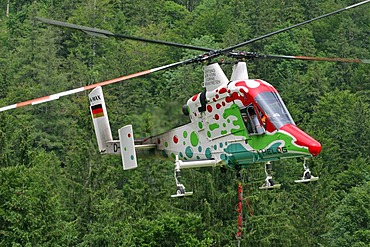Results
2 results found
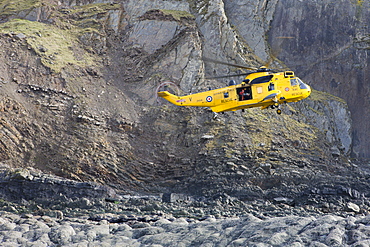
RAF helicopter performing a coastal rescue at the base of the steep cliffs of Spekes Mill Mouth, Hartland, Devon, England, United Kingdom, Europe
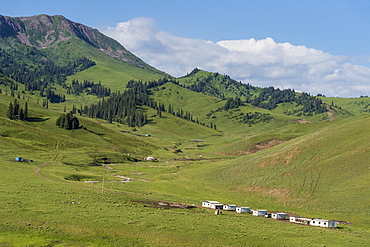
Helicopter base in Karkyra Valley, Central Tian Shan Mountain range, Border of Kyrgyzstan and China, Kyrgyzstan, Central Asia, Asia
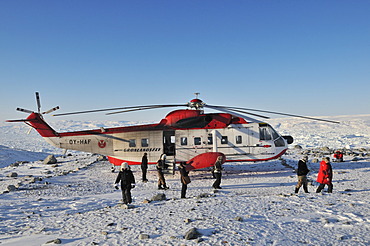
Sikorsky helicopter flying tourists to icebergs in the Ilulissat Fjord, Greenland, Arctic North America
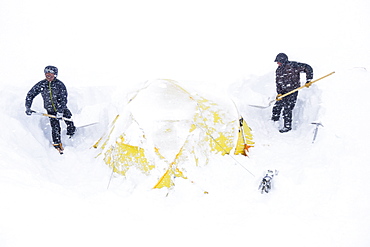
Two climbers dig out their tent after a snowstorm covered them in 14k camp on Mount McKinley, Alaska. Climbers are advised to spare no expense on a expedition-quality tent as it can mean the difference between life and death during a ferocious storm on Denali. Extra poles and repair materials are important in case of damage caused by storms. Plan to take extra pickets, wands or deadmen for tent anchors. Never leave a tent without anchoring it securely. Tents are lost each year due to sudden gusts of wind while the tent was left unattended or drying. Every climbing season High Mountain Rangers of the Denali National Park Service are called to help climbers in need. If possible the patient is brought down to base camp on foot, only in life threatening conditions a helicopter is called to evacuate the patient to a hospital in Anchorage.
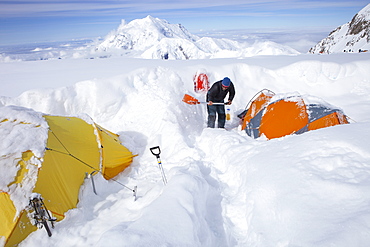
A mountain ranger is digging out tents after a snowstorm covered them during the night in 14k camp on Mount McKinley, Alaska. Climbers are advised to spare no expense on a expedition-quality tent as it can mean the difference between life and death during a ferocious storm on Denali. Extra poles and repair materials are important in case of damage caused by storms. Plan to take extra pickets, wands or deadmen for tent anchors. Never leave a tent without anchoring it securely. Tents are lost each year due to sudden gusts of wind while the tent was left unattended or drying. Every climbing season High Mountain Rangers of the Denali National Park Service are called to help climbers in need. If possible the patient is brought down to base camp on foot, only in life threatening conditions a helicopter is called to evacuate the patient to a hospital in Anchorage.
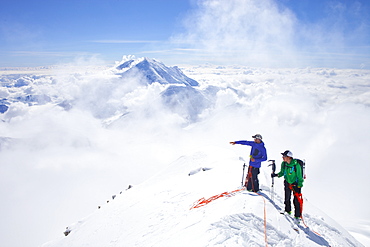
High Mountain Rangers Tom Ditola and David Weber are taking a rest on the West Rib on Mount McKinley, Alaska. Mount Hunter in the background. They are above the clouds in blue sky and the sun is shining. Mount McKinley, native name Denali, is the highest mountain peak in North America, with a summit elevation of 20,321 feet (6,194 m) above sea level. At some 18,000 feet (5,500 m), the base-to-peak rise is considered the largest of any mountain situated entirely above sea level. Measured by topographic prominence, it is the third most prominent peak after Mount Everest and Aconcagua. Located in the Alaska Range in the interior of the U.S. state of Alaska, McKinley is the centerpiece of Denali National Park and Preserve. Every climbing season High Mountain Rangers of the Denali National Park Service are called to help climbers in need. If possible the patient is brought down to base camp on foot, only in life threatening conditions a helicopter is called to evacuate the patient to a hospital in Anchorage.
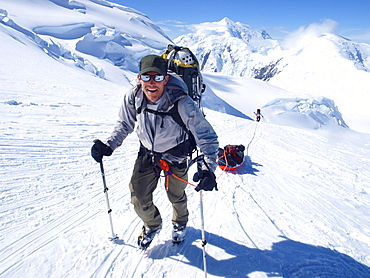
Mountain ranger Brian Scheele on this way to Windy Corner on Mount McKinley, also know as Denali, in Alaska. He is pulling a sled, that together with his heavy backpack is containing all the gear like tents, clothing and food. Every climbing season High Mountain Rangers of the Denali National Park Service are called to help climbers in need. If possible the patient is brought down to Basecamp on foot, only in life threatening conditions a helicopter is called to evacuate the patient to a hospital in Anchorage. Mount McKinley, native name Denali, is the highest mountain peak in North America, with a summit elevation of 20,321 feet (6,194 m) above sea level. At some 18,000 feet (5,500 m), the base-to-peak rise is considered the largest of any mountain situated entirely above sea level. Measured by topographic prominence, it is the third most prominent peak after Mount Everest and Aconcagua. Located in the Alaska Range in the interior of the U.S. state of Alaska, McKinley is the centerpiece of Denali National Park and Preserve.
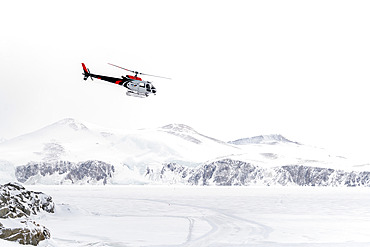
A German BGR helicopter used in Terre Victoria to transport geologists to specific research points. These are one-off scientific programs, involving the collaboration of several countries, in this case Germany and Italy. The Germans set up a base camp several dozen kilometers from the Italian Mario Zucchelli station, using Italian logistical resources such as the Laura Bassi icebreaker to transport the helicopter, the equipment needed to set up the base camp, scientific equipment and, of course, personnel. All of this was delivered to the Mario Zucchelli station for onward transport by helicopter to the search site. Victoria Land, Antarctica
